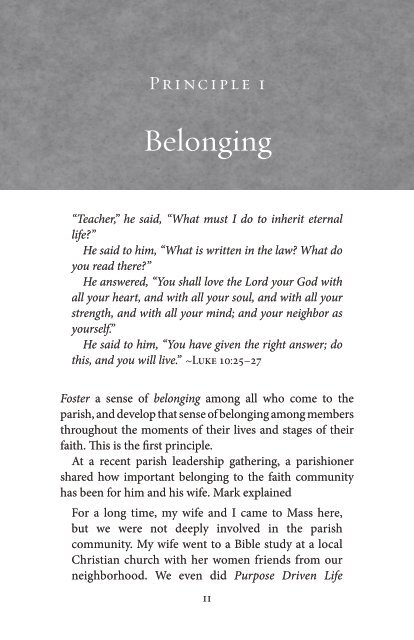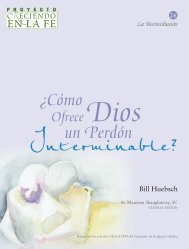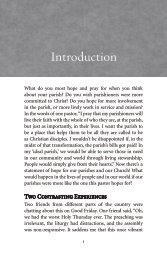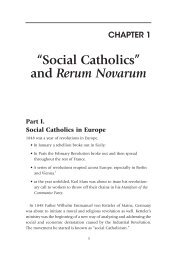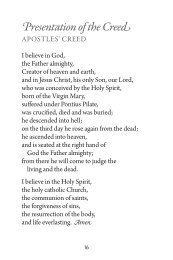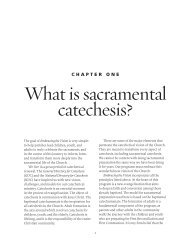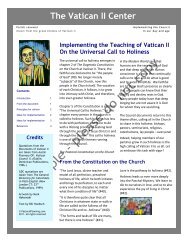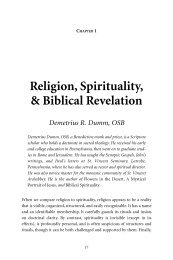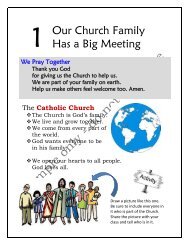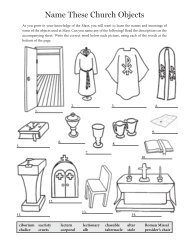Belonging - Pastoral Planning
Belonging - Pastoral Planning
Belonging - Pastoral Planning
Create successful ePaper yourself
Turn your PDF publications into a flip-book with our unique Google optimized e-Paper software.
Principle 1<br />
<strong>Belonging</strong><br />
“Teacher,” he said, “What must I do to inherit eternal<br />
life”<br />
He said to him, “What is written in the law What do<br />
you read there”<br />
He answered, “You shall love the Lord your God with<br />
all your heart, and with all your soul, and with all your<br />
strength, and with all your mind; and your neighbor as<br />
yourself.”<br />
He said to him, “You have given the right answer; do<br />
this, and you will live.” ~Luke 10:25–27<br />
Foster a sense of belonging among all who come to the<br />
parish, and develop that sense of belonging among members<br />
throughout the moments of their lives and stages of their<br />
faith. This is the first principle.<br />
At a recent parish leadership gathering, a parishioner<br />
shared how important belonging to the faith community<br />
has been for him and his wife. Mark explained<br />
For a long time, my wife and I came to Mass here,<br />
but we were not deeply involved in the parish<br />
community. My wife went to a Bible study at a local<br />
Christian church with her women friends from our<br />
neighborhood. We even did Purpose Driven Life<br />
11
12 Forming Generous Hearts<br />
with the same group. It was hard coming to Mass<br />
but not really feeling a part of the community. While<br />
we appreciated what we were learning about God’s<br />
word with our Protestant friends, there was nothing<br />
about the sacraments, nothing about the richness of<br />
our Catholic tradition. We were torn; we loved our<br />
friends, but we sensed we were missing something in<br />
our lives. Through God’s grace my wife was moved to<br />
experience a parish retreat here, and she met a group<br />
of women whose company she really enjoyed. Slowly<br />
she became connected here. God’s hand continued at<br />
work in this; she and I joined the other women and<br />
their husbands to form a small faith community and<br />
the friendships that developed in that group have<br />
changed our lives. As I look back, I think God thought<br />
I really needed intense support. Three of the strong<br />
Christian men in our group are now in formation for<br />
the diaconate (and continue to guide and inspire me)!<br />
It was, and is, belonging to this group of Catholic<br />
people that has brought me into the life of the parish<br />
and has made me a stronger Christian.<br />
The conversation that followed Mark’s sharing was deeply<br />
moving. At round tables, each parishioner told a little of his<br />
or her own story. One by one, the participants expressed<br />
gratitude that someone had taken time to invite and<br />
encourage their involvement and deepening relationship<br />
with the faith community. For each person in the room,<br />
that initial relationship with the community had resulted<br />
in a more profound relationship with Christ; God became<br />
more “real” and connected to their every day lives through<br />
the reality of parish life.
<strong>Belonging</strong> and Belief<br />
What unfolded in this discussion illustrates findings in<br />
recent Gallup Organization studies. In most cases, belief<br />
does not lead to belonging, but rather, belonging leads to<br />
belief (Albert L. Winseman, Growing an Engaged Church,<br />
Gallup Press, New York, 2007, p. 44). The Christian<br />
community is the embodiment of the Body of Christ. As<br />
such, we experience Christ’s presence through one another,<br />
particularly when we gather at the Eucharistic table. It<br />
stands to reason, then, that the parish community should<br />
be one that has its arms wide open at all times for every<br />
person. Fostering a sense of belonging is vital, since this<br />
Engagement is a sense of belonging.<br />
<strong>Belonging</strong> 13<br />
<br />
Engaged parishioners:<br />
» are loyal and have a strong psychological connection<br />
to their parish;<br />
» are more spiritually committed;<br />
» are more likely to invite friends, family members, and<br />
coworkers to a parish event;<br />
» give more, both financially and in commitment of their<br />
time;<br />
» organize their lives around their parish because<br />
through it their faith has grown and deepened;<br />
» have found opportunities to serve and help others in<br />
their parish;<br />
» have developed their most meaningful interpersonal<br />
relationships in their parish.<br />
(Growing an Engaged Church, p. 67–68)
14 Forming Generous Hearts<br />
Think of your<br />
own experience.<br />
When did you<br />
move from<br />
“going to Mass”<br />
to having a sense<br />
of belonging in<br />
your parish<br />
Who or what<br />
helped facilitate<br />
that movement<br />
is the way many will experience<br />
and deepen their faith in Christ.<br />
The most striking element of<br />
the Gallup research may be<br />
this: parishioner engagement,<br />
that sense of belonging to the<br />
parish, is primarily a result of<br />
feeling that we are of value to the<br />
community.<br />
Changing the Way the<br />
Parish Feels<br />
The parishes that seem to live<br />
discipleship and stewardship<br />
most fully are ones in which<br />
people say, “when I am there, it<br />
feels different than when I am at<br />
another church.” That feeling comes from people who are<br />
spiritually committed individuals. These people know their<br />
parish as the place that supports them throughout their<br />
lives in Christ; they know that others depend on them to<br />
recognize their needs, respond to them, and acknowledge<br />
the ways in which each person contributes to the whole.<br />
That feeling comes when we are in the presence of a group<br />
of people who have fallen in love with Christ and from<br />
whom that love flows out. They seek to have the mind of<br />
Christ, to set their hearts on all that is holy, and to offer<br />
their lives in loving imitation of our self-emptying Lord.<br />
Parishes that are communities of this sort are attentive to<br />
the many ways in which we may set the stage for building<br />
a strong relationship with Christ, and in which people may<br />
become engaged in the life of the faith community.
Lives are Changed<br />
Engagement, true belonging,<br />
leads people to happier lives. In<br />
fact, the people who are engaged<br />
are vastly more likely to strongly<br />
agree with this statement: “I am<br />
completely satisfied with my life”<br />
(Winseman, 39). We know that<br />
people who take discipleship<br />
seriously still experience life’s<br />
challenges; if anything, disciples<br />
know the depth and breadth of<br />
all that life holds for them, both<br />
<strong>Belonging</strong> 15<br />
<br />
Indicators of a<br />
Parish’s Spiritual<br />
Health<br />
Four Important<br />
Outcomes<br />
» Inviting<br />
» Giving<br />
» Serving<br />
» Life<br />
Satisfaction<br />
<br />
challenges and joys. Engagement in the faith community,<br />
however, helps to root us in the fullness of hope in Christ,<br />
giving our lives more meaning and purpose.<br />
Those who are engaged are also much more likely to invite<br />
others to join them at a parish function (worship, social,<br />
service, or catechetical); they serve more in their community,<br />
and give more of their financial resources to the parish.<br />
While in the past, most parishes have spent much energy<br />
and attention on developing the actions noted above, the<br />
studies show clearly that inviting, serving, giving, and life<br />
satisfaction are outcomes, and are the result of engagement<br />
and spiritual commitment. This information is vital for<br />
us as we shape parish practice. We should be attentive to<br />
the many ways in which we can build engagement in our<br />
parishes, with the assurance that the important outcomes<br />
will follow (Winseman, 39–43).<br />
Engagement is key to drawing people toward powerful<br />
expressions of faith. In short, true belonging leads to<br />
living discipleship and stewardship. There is a caveat here,
16 Forming Generous Hearts<br />
however. Gallup survey (2001–2005) information indicates<br />
that only sixteen percent of Catholics are fully engaged in<br />
their parishes; forty-nine percent are not engaged (and just<br />
waiting to be drawn more deeply into the faith community,<br />
and through the community to Christ); thirty-five percent<br />
are actively disengaged (diminishing the community<br />
through apathy or negativity).<br />
<br />
Two Other Types of Parishioners<br />
The “Not Engaged”:<br />
» may attend regularly, but do not have a strong<br />
emotional connection to the parish;<br />
» are connected socially more than spiritually;<br />
» give moderately but not sacrificially;<br />
» do a minimal amount of service in the community;<br />
» are less likely to invite others and are more likely to<br />
leave;<br />
» are not negative, and are just waiting for an<br />
opportunity to become engaged.<br />
The Actively Disengaged Fall into Two Groups:<br />
» Apathetic:<br />
• come only once or twice a year if at all;<br />
• can tell someone which parish they belong to, but<br />
often by location rather than by name;<br />
» Physically present but psychologically hostile:<br />
• are almost always present,<br />
• are unhappy with their parish and insist on<br />
sharing their misery with just about everyone.<br />
(Growing an Engaged Church, p. 68–70)
The Real Possibilities<br />
<strong>Belonging</strong> 17<br />
This is an area of great concern and of great potential! Think<br />
for a moment of all that could happen in the lives of people<br />
and in the life of your parish community, not to mention<br />
the world, if only a small portion of the currently “not<br />
engaged” were to experience true belonging. Rather than<br />
exhausting ourselves in trying to meet the demands of the<br />
actively disengaged, those who interpret the data suggest<br />
strengthening the engaged and focusing our outreach on<br />
the “not engaged.” A parishioner leader recently commented<br />
on this insight.<br />
This makes sense to me, to concentrate on the “not<br />
engaged.” I spent ten years of my life teaching and<br />
practicing the concept of total quality management, and<br />
at the end of it, realized I had spent ten years beating<br />
my head against the wall, trying to make everyone<br />
happy, rather than focusing my energy and attention<br />
on the areas in which I had the greatest possibility of<br />
success. We should learn from experiences like that<br />
and adjust our practices, in business and in the Church,<br />
accordingly.<br />
Keeping the importance of engagement in mind, you<br />
can begin to examine your current practices and make<br />
subtle shifts, reaching out to those who are with you every<br />
week but who do not feel they truly belong. If belonging<br />
is as vital as the Gallup research and conversations such<br />
as the one with Mark described above demonstrate, there<br />
must be things your parish can do to create an atmosphere<br />
in which people sense that they truly belong to the<br />
community.
18 Forming Generous Hearts<br />
<strong>Belonging</strong> Leads to Commitment<br />
What will you really be trying to do as you foster a sense of<br />
belonging in the parish community That sense of belonging<br />
is important because people who have a deep relationship<br />
with their faith community are more likely to be spiritually<br />
committed. That’s the crux of the Gallup Organization’s<br />
understanding of engagement. Spiritually committed<br />
people, people whose faith shapes the way they live, are<br />
more likely to exhibit those outcomes we spoke of earlier, of<br />
inviting, serving, giving, and life satisfaction. The spiritually<br />
committed person has a sense that his or her faith community<br />
will support and demonstrate God’s love in every moment of<br />
life. That is a pretty astounding thing when you think about<br />
it! Fostering a sense of belonging helps us to create a place in<br />
which people feel at home, a place where we know there is a<br />
deep connection between our faith and our life.<br />
Developing a Vision<br />
“Teacher,” he said, “What must I do to inherit eternal<br />
life”<br />
He said to him, “What is written in the law What do<br />
you read there”<br />
He answered, “You shall love the Lord your God with<br />
all your heart, and with all your soul, and with all your<br />
strength, and with all your mind; and your neighbor as<br />
yourself.”<br />
He said to him, “You have given the right answer; do<br />
this, and you will live.” ~Luke 10:25–27<br />
This gospel passage was chosen for the beginning of this<br />
chapter not because it is the greatest commandment but<br />
because of what follows in Luke’s account, the parable of
<strong>Belonging</strong> 19<br />
the Good Samaritan. This commonly-known parable is<br />
often cited as why we should take care of those in need,<br />
but we sometimes miss the beginning of the parable in<br />
which the lawyer (who had answered correctly, with love<br />
of neighbor) continues to question Jesus, saying, “And who<br />
is my neighbor” Jesus didn’t simply answer, but instead<br />
told the parable of the Good Samaritan to illustrate the<br />
concept of neighbor. The Oxford Bible Commentary helps<br />
us better understand: “Neighborliness knows no bounds<br />
and must proceed from an attitude of spontaneity and<br />
self-forgetfulness….The parable in its setting calls for an<br />
abandonment of all status, privilege, and exclusiveness”<br />
(Oxford University Press, 2000, p. 942). When we expand<br />
our boundaries and allow for spontaneity, we do abandon<br />
our views of who is in or out of the parish and help create<br />
that sense of belonging that is vital for engagement.<br />
How does your parish answer the question, “who is my<br />
neighbor”<br />
What the Documents Say<br />
Our Church’s guiding documents highlight this need to<br />
facilitate belonging. Often, while specifically written for<br />
a particular segment of our population, these documents<br />
give us a clear understanding of the life we should share<br />
with all members. For example, Renewing the Vision, the<br />
bishops’ pastoral letter on youth ministry, provides great<br />
insight into creating this sense of belonging. Ministry with<br />
youth, it states:<br />
^ “reaches out to young people by meeting them in their<br />
various life situations, building relationships, providing<br />
healing care and concern, offering a genuine response
20 Forming Generous Hearts<br />
to their hungers and needs, and inviting them into a<br />
relationship with Jesus and the Christian community;<br />
^ invites young people personally into the life and<br />
mission of the Catholic community so that they may<br />
experience the support, nurture, and care necessary to<br />
live as Christians;<br />
^ calls young people to grow in a personal relationship<br />
with Jesus Christ, to make his message their own, and<br />
to join us in the continuing process of conversion to<br />
which the gospel calls us;<br />
^ challenges young people to follow Jesus in a life of<br />
discipleship—shaping their lives in the vision, values,<br />
and teachings of Jesus and living his mission in their<br />
daily lives through witness and service;<br />
^ calls young people to be evangelizers of other young<br />
people, their families, and the community” (USCCB,<br />
1997, p. 37).<br />
This development of a sense of belonging is echoed in<br />
Sons and Daughters of the Light in Goal Two: Connecting<br />
Young Adults with the Church. There our bishops invite<br />
us “to make contact with young adults and to invite and<br />
welcome them to participate in the life and mission of<br />
the Christian community, which proclaims Jesus Christ<br />
by preaching the gospel.” The document illustrates this<br />
welcome in its first objective: “Evangelizing Outreach: To<br />
identify places where young adults gather and to connect<br />
them personally with the Church by listening to their<br />
concerns, hopes, and dreams, and by welcoming them<br />
into a community of faith” (USCCB, 1996, p. 33).<br />
Covering all ages, stages, and ethnicities, Go and Make<br />
Disciples encourages us with its three goals, particularly the
second goal: “To invite all people<br />
in the United States, whatever their<br />
social or cultural background, to<br />
hear the message of salvation in<br />
Jesus Christ so they may come<br />
to join us in the fullness of the<br />
Catholic faith” (p. 57).<br />
Exploring Successful<br />
Practice<br />
Practice One: Extend a Bigger<br />
Welcome<br />
<strong>Belonging</strong> 21<br />
What vision of a<br />
belonging parish<br />
emerges for<br />
you from these<br />
documents<br />
If you were asked<br />
to describe this<br />
vision in one<br />
sentence, what<br />
would you say<br />
Creating a sense of welcome is<br />
not only vital for those who are<br />
guests or newcomers, but for<br />
every person, at every moment<br />
of their lives. Talk with people who have been away for a<br />
while and have returned. Often, they speak of leaving and<br />
wondering if anyone would notice their disappearance, or<br />
of being warmly welcomed at another church, and knowing<br />
somewhere in their heart that they had found a place where<br />
people cared. On their return, if the parish has changed (or<br />
they have come back to Catholicism through a different<br />
parish), returning Catholics will speak of the importance of<br />
being offered a genuine welcome.<br />
When it is genuine (and people will intuitively sense its<br />
authenticity), this open-armed and open-hearted welcome<br />
is a living manifestation of the Spirit of Christ. Think of the<br />
many stories we have of Jesus welcoming people, often those<br />
whom the established folks of the time were not thrilled<br />
to have in their company: the poor, the widows, children,
22 Forming Generous Hearts<br />
people who weren’t the brightest or the best. Jesus sought<br />
out plain people who would become trusted and faithful<br />
disciples.<br />
As people come into relationship with Christ through<br />
the community, they naturally want to share their love with<br />
others, and their welcome is a powerful living extension of<br />
the love of God. That is what Mark was describing the night<br />
of the parish leaders’ meeting. He had a powerful experience<br />
of Christ’s presence through the people who drew him into<br />
the community of believers, just as those who encountered<br />
Jesus did when he drew them into the company of those<br />
who followed him.<br />
Practice Two: Make Hospitality Your First Rule<br />
Walk into your parish on a Sunday and approach the<br />
church as though you were an outsider. Or, visit a parish<br />
in which you know no one. What is your first impression<br />
Do you feel that you are valued, that the community that<br />
is gathering will be richer for your participation It seems<br />
that many of us spend much time in preparation of the<br />
liturgy, which is a necessary and proper thing to do, but we<br />
forget that the act of gathering, of coming together for the<br />
celebration, begins a long while before the song, Penitential<br />
Rite, and opening prayer. The “gathering” really begins in<br />
people’s hearts, as they gather their thoughts and prepare<br />
themselves to pray with the community. The “gathering”<br />
begins as parents get young children ready, and as singles,<br />
divorced adults, and widows reflect on the week that has<br />
passed and ask our Lord to nourish and strengthen them<br />
for the week ahead. The “gathering” continues as people<br />
park their cars and walk side by side with others with whom<br />
they will offer prayers this day. The “gathering” includes
<strong>Belonging</strong> 23<br />
the ways in which people are greeted as they arrive in the<br />
church building, are assisted if needed as they find a place<br />
inside, and look to the people around them for a sign of<br />
hospitality.<br />
There are things we can do at church before and after the<br />
Mass, too, that will increase the sense of hospitality that<br />
people feel upon their arrival. These things could appear to<br />
be insignificant, but these small things add up to something<br />
much greater. They work together to create an atmosphere<br />
of hospitality and warm welcome, as though the Lord<br />
himself were standing in our midst (and Christ does stand<br />
in our midst, after all!).<br />
Expect Resistance, Invite Inclusion, Multiply Ministry.<br />
Sometimes when parish leaders first begin discussing ways<br />
to become more hospitable, they encounter unexpected<br />
resistance from long-standing members. Much of the<br />
resistance has to do with change, and with the uncertainty<br />
of what might happen if newcomers offered to become<br />
involved. Those who have been stalwart members for years<br />
are secure in the knowledge that the parish needs them;<br />
what would be the result of welcoming the many new<br />
families who arrived for Mass each week<br />
For example, most parishes already have ushers who<br />
faithfully serve each Sunday. Perhaps suggest that the ushers<br />
continue to take care of the details inside the worship space.<br />
The ushers know how to seat people efficiently, how to take<br />
up the collection, assist those with physical disabilities, and<br />
help visitors find their family members. The ushers know<br />
how to take care of people inside the church, and they are<br />
busy with their tasks.<br />
Ministers of hospitality can be recruited for the<br />
gathering space and may stand outside, if possible, at least
24 Forming Generous Hearts<br />
on nice days. These individuals watch for people who need<br />
assistance getting into church, warmly greet everyone<br />
as they arrive, especially anyone who seems uneasy or<br />
unfamiliar, and they distribute the bulletins at the end of<br />
Mass. Hospitality ministers outside of the worship space,<br />
ushers within. You can double the number of people<br />
making certain everyone is taken care of, find new ways<br />
for people with the gift of hospitality to serve, and the<br />
result will be a new sense of welcome for all who come<br />
to be with you for the celebration of the Eucharist. Those<br />
who earlier resisted may come to appreciate the increased<br />
welcome for liturgies. When that happens, invite them to<br />
recruit others to join them. The ministers of hospitality<br />
may help with other events at which there will be many<br />
visitors, spreading the welcome beyond the Sunday Mass.<br />
The solution to the need for better hospitality at Sunday<br />
liturgy ripples into other areas of parish life, as longstanding<br />
members begin to see the value of the parish they<br />
love. They will find that the inclusion of others in ministry<br />
enhances the service offered to parishioners, guests, and<br />
to those in need in the world.<br />
What about the “person in the pew” How does the welcome<br />
spread beyond those who are designated as ministers of<br />
hospitality Just before Christmas or Easter, many pastors<br />
invite their members to extend a special welcome to visitors,<br />
“even if they sit in your pew.” This always gets a giggle, as<br />
many of us find ourselves sitting in the same place week after<br />
week. Such a reminder helps not just with the big feasts; once<br />
people become aware of the difference a welcome can make,<br />
they will find themselves regularly welcoming people, even<br />
seeking out guests and newcomers.<br />
Practice Three: Widen the Circles
The situation of already-involved members holding tightly<br />
to the ways in which they offer service often extends<br />
beyond the celebration of the liturgy. In many parishes,<br />
people speak of the 20-80 rule: twenty percent of the people<br />
do all the work, while eighty percent attend, benefit from<br />
the service of others, and leave. (Remember the principle<br />
of engagement: those who are not engaged will not give to<br />
the extent of those who are engaged.) The 20-80 rule also<br />
applies where financial giving is concerned. In many cases,<br />
the same twenty percent who give their time to the parish<br />
also give their financial support, while the remaining eighty<br />
percent give little if any of their resources. “There’s plenty<br />
to do around here,” you’ll hear the twenty percent say, “if<br />
others would just step up and offer their help.” And yet,<br />
many who have offered will point out the ways in which it<br />
has been made clear to them that their help is not needed.<br />
“I’ve tried time and again,” they’ll remark, “but the insiders<br />
have it all under control.” This inside-outside dynamic is<br />
difficult to break through, but it can be done.<br />
A colleague who provides pastoral staff training days<br />
encourages people to “widen the circles.” Picture yourself<br />
in church at Mass on Sunday, he’ll ask people. Now, look<br />
around yourself. Chances are, you know almost everyone<br />
who surrounds you, at least by face. You’ve probably spoken<br />
to most of them, and have ministered with many in the last<br />
few months. Now, look beyond you. Can you see the faces of<br />
the people in the two or three rows just beyond your circle<br />
of friends or colleagues Widen your circles! Think about<br />
how you might help those people to know their value and<br />
to belong. Then, act on what you are thinking about right<br />
now. You might be amazed at the result!<br />
Practice Four: Invite People<br />
<strong>Belonging</strong> 25
26 Forming Generous Hearts<br />
People in church circles often speak of invitation as<br />
being something not very “Catholic,” or at the very least<br />
something many Catholics are not comfortable with. Even<br />
those who want to be inviting often feel inadequate to the<br />
task; “I was just never taught to invite people to come to<br />
church with me the way my evangelical brothers and sisters<br />
were,” many will comment. Even when it’s a parishioner<br />
who could be the object of the invitation, and the invite<br />
is simply to a parish event, we may still feel tongue-tied.<br />
“What if the person says no” people wonder. “What if the<br />
person agrees, then what” Yet most of us realize, when we<br />
stop to reflect as the parishioner leaders did in our opening<br />
story, that an invitation made a remarkable difference in<br />
our lives. Most of us become involved, or come to belong<br />
more deeply, as the result of an invitation.<br />
So, how to get over invitation-hesitation This may sound<br />
silly, but the first step is to practice! Consider holding an<br />
intergenerational catechesis gathering called “How to share<br />
your faith with others.” The gathering includes time for<br />
people to share part of their experience of Christ in their<br />
lives, strengthening their own sense of God’s presence,<br />
and becoming more comfortable in sharing their faith<br />
with neighbors, coworkers, or family members. Begin with<br />
everyone together, and then invite high school youth to<br />
take younger children (with adult leaders) to a separate<br />
place for a while. The youth can help the children practice<br />
talking with friends and classmates, giving the youth an<br />
opportunity to witness as well. Some parishes hold a dryrun<br />
practice before phone campaigns to invite members to<br />
a special event. No matter how you do it, practicing can be<br />
a good step toward becoming more inviting.<br />
Equip people with a card or letter that can be shared
<strong>Belonging</strong> 27<br />
with neighbors and friends. Sometimes it is easier to<br />
invite someone by giving the person a card that has been<br />
prepared by a parishioner team, with the details of the<br />
event, including time, location, and a phone number or<br />
web address where people can get more details. A pullout<br />
or cut-out section of the bulletin works for this type of<br />
invitation as well.<br />
When you focus on “invitation,” remember what the<br />
outcome is supposed to be: a deep sense of belonging<br />
through which people become more deeply conformed to<br />
Christ, and in that conformity seek to be more Christ-like.<br />
Practice Five: Focus on New Parishioners<br />
There is no time like the moment when people register in a<br />
parish to insure that they are warmly welcomed and invited<br />
to become immersed in parish life. Sometimes parish<br />
leaders take a new parishioner’s desire to join them for<br />
granted, or assume that new members will figure out ways<br />
to become connected on their own. Yet, the parishes that go<br />
out of their way to welcome and provide orientation to new<br />
parishioners find that these newest members are often ready<br />
and willing to become involved, and will offer meaningful<br />
contributions. People who register in our parishes do so<br />
because they have sensed that the parish could be a place<br />
for them, a place in which they may grow as disciples.<br />
These are people who are ready to be drawn deeply into<br />
relationship with the community and with Christ. How can<br />
you let them know that you are happy that they are coming<br />
to be one with you<br />
While many parishes have some sort of new parishioner<br />
welcome ministry, few seem to evaluate what is being done<br />
to welcome new members or to think creatively about
28 Forming Generous Hearts<br />
new possibilities for this ministry. If you’re thinking about<br />
the importance of belonging and of evangelization as you<br />
structure greetings for new parishioners, the ministry that<br />
results will be more than one or two moments just after<br />
registration. It will more likely be a series of greetings over<br />
a period of time that are designed to bring new members<br />
fully into the life of the parish.<br />
Many parishes have a team of people who visit the<br />
homes of new parishioners, often bringing a small gift or<br />
house blessing kit with them. Some have a Bread Ministry,<br />
in which the new members are welcomed with a loaf of<br />
home-baked bread, along with a note that welcomes them.<br />
Following this brief visit with an invitation to a gathering<br />
in a parishioner’s home or at the parish, many newparishioner-welcome<br />
teams take time to think about ways<br />
to invite the new members into a group or ministry that<br />
seems particularly appropriate. For example, the mother<br />
of an infant might receive a phone call from a member<br />
of the Moms’ group, or a young adult might be invited<br />
to the next parish retreat; a teen might get a phone call<br />
from a parish youth who attends the same high school,<br />
and an older member who has just moved in with his<br />
adult child might be visited by a member of the Knights<br />
of Columbus. Becoming acquainted with new members<br />
enough to pair them with a person or group with whom<br />
they have something in common makes the invitation<br />
even more special. What a sign of the way in which the<br />
parish values them as a person!<br />
“It’s a very exciting time in your life,” Debbie remarked<br />
on the phone not too long ago. “Let’s find a time when we<br />
can meet, and I’ll walk you through all the steps that will<br />
be part of your life in the coming months. You’ll see, it will
<strong>Belonging</strong> 29<br />
be wonderful!” Debbie is a parishioner who meets with all<br />
the couples who are preparing for marriage. She explains<br />
the steps of the marriage preparation process, checks in<br />
with the couples occasionally to assure them of the parish’s<br />
prayers and support, and arranges for a parishioner wedding<br />
coordinator to facilitate the rehearsal and the wedding<br />
celebration. In short, Debbie is a representative of the<br />
parish community who warmly welcomes the couple and<br />
their family and friends, giving them a gift that cannot be<br />
measured. Debbie and the other members of the marriage<br />
preparation team let the couples know that the parish is<br />
committed to them. The couples come to understand that<br />
the parish values them and the sacrament of marriage,<br />
and the community rejoices with them in this important<br />
moment of their lives.<br />
Sometimes it seems the ways in which our parishes<br />
view special moments in people’s lives can be a version of<br />
“the glass is half-empty,” or “the glass is half-full” kind of<br />
thinking. Some will say, “I don’t know why we bother with<br />
so much emphasis on sacramental preparation. People really<br />
just want to get it over with, and they don’t stick around<br />
long afterward. Just give them what they have to have, and<br />
move on.” Others see sacramental preparation and similar<br />
transition moments as opportunities for evangelization,<br />
for welcoming people to deepen their relationship with<br />
Christ through the community. Sure, there is information<br />
to be given to couples preparing for marriage, or for new<br />
parents preparing for the baptism of their child. Children<br />
need to prepare for their first reception of the sacraments<br />
of penance or Holy Communion, and often their parents<br />
need to refresh their understanding of these sacraments.<br />
Those moments, however, also have much evangelization
30 Forming Generous Hearts<br />
potential. A healthy balance between information-giving<br />
and relationship-building can do much to help people feel<br />
that the parish values them and desires their continued<br />
presence within and for the community.<br />
Practice Six: Keep the Door Open<br />
When people have been away from the Church for a while<br />
or have been considering Catholicism and are ready to<br />
inquire about the catechumenate, it is often tough to make<br />
the first phone call or to approach a priest or pastoral staff<br />
person. A simple way to invite and facilitate those early<br />
conversations is an Open Door session. Open Door typically<br />
takes place three times a year, once in the fall, once a couple<br />
of weeks after Christmas, and once just after Easter. Have<br />
announcements in the bulletin and at the end of Mass.<br />
Place posters in the vestibule if possible, or on an outdoor<br />
sign. The announcement can read, “There’s always an open<br />
door here. If you have been away from the church for some<br />
time, or would like more information about Catholicism,<br />
or if you simply have questions you’d like to ask, a team of<br />
caring people will be waiting for you.” (Then list the time<br />
and location of the meeting.) The gathering is simple, too: a<br />
few nice refreshments and the opportunity for each person<br />
to introduce himself or herself and explain what brings<br />
them there; a few listening people who are familiar with the<br />
catechumenate and returning Catholic processes; and time<br />
for each person to talk individually with one of the team<br />
members. Each person leaves with a good sense of what<br />
could come next: updating for someone who has been away<br />
for a while; the inquiry for a person who is ready; a meeting<br />
with a member of the annulment team for another.<br />
A year ago, a parish held an Open Door session in
<strong>Belonging</strong> 31<br />
the midst of the Easter season, and it happened that the<br />
announcements were made at Sunday Masses at which First<br />
Communion was being celebrated. The following week, a<br />
woman called the parish office. “I heard the announcement,”<br />
she said, “and I felt that Father was talking to me. I have been<br />
away from the Church for so long, and was only there on<br />
Sunday for my granddaughter’s First Communion. I didn’t<br />
expect to be receiving a gift myself! What a great sign of the<br />
way your parish cares for people, no matter who they are or<br />
where they are in life.”<br />
Fostering a sense of belonging in our parish communities<br />
is really about helping people to know the love of Christ<br />
through the flesh and blood of real people.<br />
Practice Seven: Do Great Things with Great Care<br />
Be mindful of doing great things with great care, especially<br />
the celebration of the liturgy. There is no better way to help<br />
people feel they belong than to take the time to gather well,<br />
pray well, reflect well, and be sent out with a sense that what<br />
we are about when we are together is of great value. What<br />
we welcome and invite people into is the life of the Christian<br />
disciple, nourished and shaped by our celebrations of<br />
the paschal mystery of God’s love for us in Christ. In the<br />
midst of all that we will discuss, it is important to keep our<br />
priorities straight: our primary and central action is the<br />
celebration of the Eucharist and our sacramental life. While<br />
there are many elements that work together to shape the<br />
community of faith, we must not lose sight of what is most<br />
fundamental.
32 Forming Generous Hearts<br />
Practice Eight: Play Together!<br />
“The parish that plays together stays together,” one pastor is<br />
fond of saying. Offer people the opportunity to get to know<br />
each other through socials, game nights, parents night out<br />
events, potluck dinners, picnics, and movie nights. The<br />
possibilities are only limited by the imagination of those<br />
who plan such events. Draw together a group of hospitalitygifted<br />
members and set them loose!<br />
<br />
» What is your experience within your parish<br />
» What practices contribute to feelings of belonging<br />
in your parish<br />
» What ideas do you have for ways to build upon<br />
what is already taking place, or for developing new<br />
practices to enhance a sense of belonging within<br />
your community


